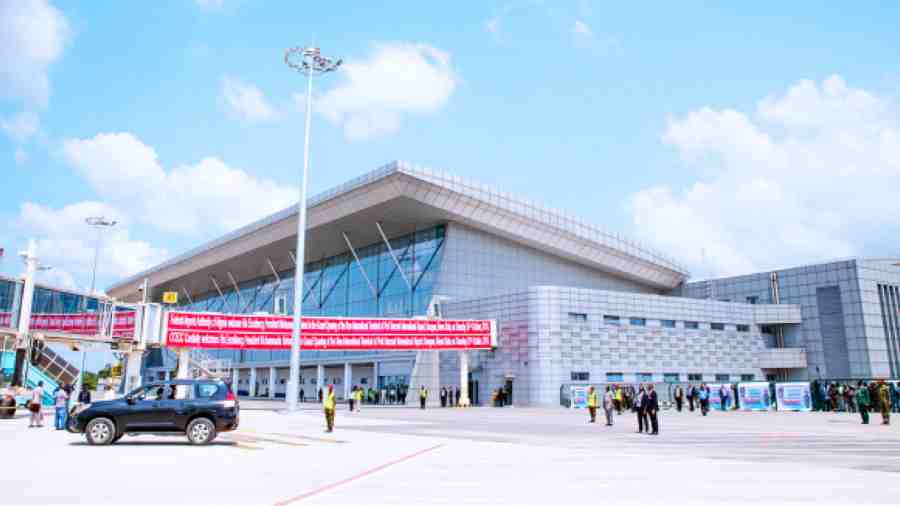How Yobe property market is changing after insurgency
The insurgency witnessed in Yobe state which became intensified in 2011 not only led to loss of lives but destruction of public buildings and facilities including private structures and assets belonging to thousands of individuals. In Damaturu, the state capital and one of the worst hit cities, many property owners fleeing the Boko Haram onslaught […]

The newly commissioned Port Harcourt International Airport Terminal Building in Rivers.
The insurgency witnessed in Yobe state which became intensified in 2011 not only led to loss of lives but destruction of public buildings and facilities including private structures and assets belonging to thousands of individuals.
In Damaturu, the state capital and one of the worst hit cities, many property owners fleeing the Boko Haram onslaught were forced to sell their properties at lower prices, and relocated to other states.
But normalcy started to return in 2015, with rising cost of properties, as wealthy individuals started to feel more secure to invest in real estate.
At the peak of Boko Haram insurgency, “speculators” smartly pushed and bought up the properties of terrified residents, and patiently waited for the situation to normalise.
“At that time, it was the only risk free strategy that one can adopt to save and accrue his capital, because almost all our businesses have been affected by Boko Haram insurgency,” said one of the real estate businessmen.
However, with the return of fleeing residents who disposed their property at give away price and influx of people to Damaturu, individuals who invested in property have started renting them out to the returnees.
The influx of non-governmental organisations (NGOs) in the city has also led to rising demand for property.
As more humanitarian aid workers from United Nations and other NGOs scramble for befitting office and residential, property investors mostly politicians, government officials and businessmen, have continued to grab incredibly huge amount for rent.
Ustaz Muhammad, a property agent in Damaturu said, more and more people are investing in properties with the hope of earning money in two ways: through rental income that comes from the tenants and then capital growth, because the value of the properties is appreciating.
“I know of an investor that bought a property for N100 million in GRA, Damaturu. He rented it out to an NGO at more than N30 million for just five years. It’s so pathetic that landlords are now giving quit notice to their old tenants, renovate the property and rent it out to NGOs at exorbitant prices,” he said.
One of the property investors, who preferred anonymity said the soaring rent was due to influx of humanitarian aid workers and NGOs in the town, making it difficult for low income earners to get befitting houses to rent.
“What we are experiencing here is significant rise in property prices due to growing population of NGOs and many people that have returned.I never thought it would be as profitable as this when I invested,” he said.
He said apart from the rent payable for the property, an average price of house in Damaturu has risen by almost 85 percent from the sharp decline in 2012, “That is why you see investors buying incomplete property from owners in strategic locations and convert them to profitable assets.”
Findings revealed that, an annual house rent in Damaturu ranges from N150,000 to N200,000 for two/three-bedroom flat at places like Bra-bra Housing Estate, Sabon Pegi and other areas of Damaturu.
Yakubu Maje, a property agent said that the cost of renting a house in Damaturu largely depends on the location, which is basically divided into line A, B and C. He said a client that wants a house in Don Etebet, Dabo Aliyu and Commissioners` Quarters falls into line A, which is a highbrow area and the rent would cost N200,000 and above. Line B includes Brabra Housing Estate and Sabon Pegi which costs N150,000 to N200,000. He said in line C, the rent is cheap because most of the houses in those locations are not standard.
A building engineer, Abdullah Gamzaki expressed concern over the rise of built-to-let properties in Yobe and Maiduguri, which according to him are likely to have serious consequences for property owners in the near and distant future.
“You can see how building materials have became too expensive here: blocks, sand, zinc, woods, toilets fittings and other accessories are on the high side. Also, the rise in the rent and property prices is temporary, because soon after the Boko Haram crisis, all the NGOs would leave the investors with no option but venture into another business,” he said.
A resident of state low-cost houses Damaturu, Malam Yunusa Lawan, said a retiree in his neighborhood quit and rented his residential home to an NGO and thereafter opened a provision store with the money received.
“He collected N12 million for a rent of 5 years. I know people like him are conscious of the fact that one day these people (NGOs) will leave.” he added.
The administration of Governor Ibrahim Gaidam has built three housing estates that include 261 housing units, 300 housing units and red bricks housing estate, accommodating almost 1,000 houses. He sold them to Yobe citizens on 50 percent discount before the beginning of insurgency in the state.
Checks by our correspondent revealed that property owners have disposed almost 20 percent of their homes during the insurgency, and those who took the risk to buy from them, are now smiling to the banks.
